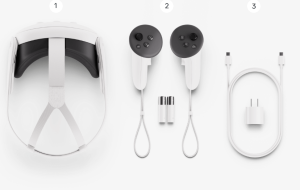
What’s The Big Deal With Quest 3 Upper Body Tracking?
VR fans are having difficulty deciding what to be most excited about with the Quest 3 Inside-Out Upper Body Tracking that will come out later this year. For one, it is the only headset to date with side cameras facing downward to track (going down) the shoulder, torso, elbow, and wrists. They tell us they will use advanced computer vision algorithms that Meta calls the “Inside-Out Body Tracking” (IOBT).
You’ll have greater accuracy because of the updated use and information of inverse kinematics (IK) that have often been inaccurate in the past. The former systems have to make guesses about the location of the head and hands as you’ve witnessed by running into the couch and other things in your living/gaming room. With the new SDK update, you’ll have a correct depiction of your location and see the torso and arms where they actually are located.
The true genius is that Quest 3 will no longer just be an estimate.
The true genius is that it will no longer just be an estimate. Developers track your body direction in a typical interaction flow called “anchor thumbtack locomotion.” This action will feel more normal when you jump or place your arms in an unlikely position — even leaning over a ledge will be realistic on your avatar.
Another exciting update in the Meta Quest 3 launch is the Generative Legs Estimator, which will be released in December. After years of research, you’ll finally have an accurate estimate of legs because of the upper-body tracking and input. This update will also work on Quest Pro and Quest 2 with the head and hands. Keep in mind, the Legs system is just an estimator of what’s really going on—not actual tracking. We’ll see our avatar jump and crouch (and see the accurate positions), but it won’t track something like raising up a knee.
Featured Image Credit: Upper Body Tracking System for Quest 3; From Meta; Thank you!




